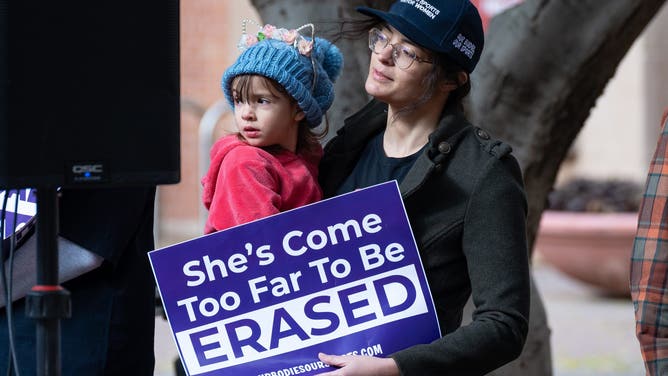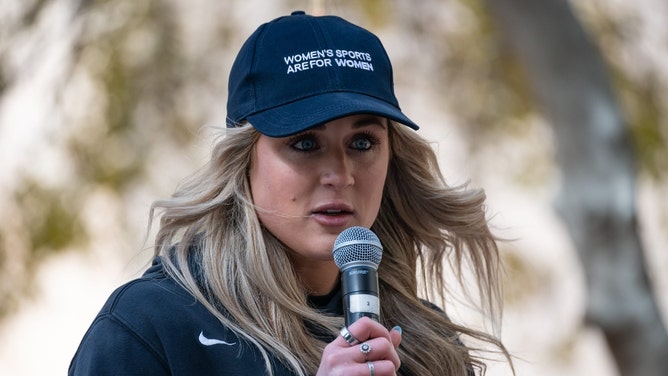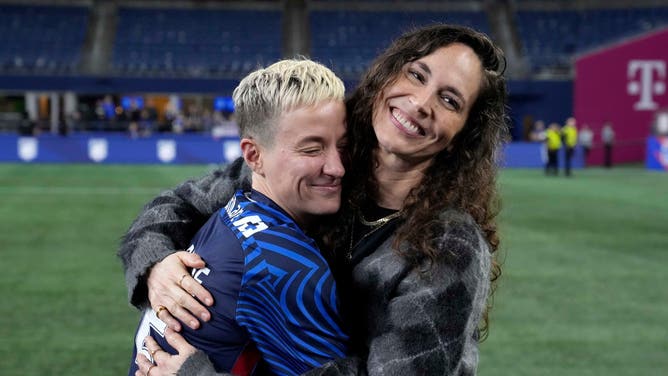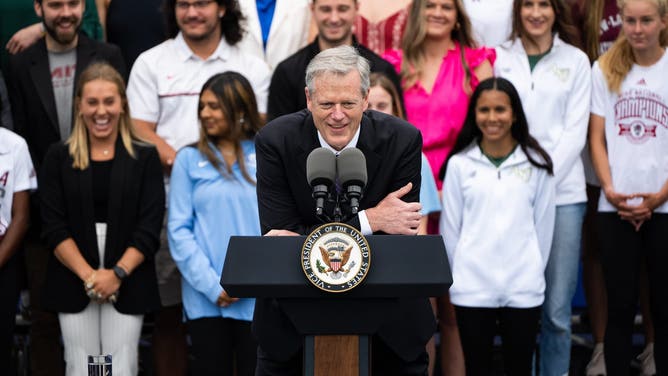Over 3,000 Current & Former Female Athletes, Coaches Urge NCAA Board Of Governors To 'Protect Women's Sports'
The NCAA Board of Governors plans to meet on Thursday and on the agenda is a discussion – and possibly a vote – on the issue of whether to include transgender women (biological men) in women's sports, OutKick has learned.
The Our Bodies, Our Sports coalition sent letters and emails to the NCAA board members from over 3,000 current and former female athletes and coaches urging the NCAA to "protect women's sports." More than 78,000 personalized emails and letters have been sent to members of the NCAA Board of Governors in the last week alone.
It is not yet known if the Board of Governors plan to hold an actual vote on the issue during Thursday's session. The NCAA Board of Governors comprises 16 members and includes presidents of universities and athletic directors from Division I, II, and III, among other members.
According to the Our Bodies, Our Sports coalition, "Male athletes have stolen over 924 trophies, medals, and titles from women and girls across 448 different competitions and over 30 different sports."

Myra Wood holds her daughter, Remi Wood, as they show up to support the Independent Women's Forum's "Our Bodies, Our Sports: We Won't Back Down" rally in Phoenix.
(Megan Mendoza/The Republic/USA TODAY Network)
And while "stealing trophies" is a problem, it's not the only issue with allowing biological males in women's sports.
"Unfortunately, instances of biological males competing in women’s sports are happening more and more frequently. It may be easy to ignore the injustice when the athlete doesn’t command a trophy. But it is an injustice nonetheless, and I sincerely hope the members of the NCAA Board of Governors will put a stop to it," Paula Scanlan, an Independent Women's Forum Ambassador and former University of Pennsylvania swimmer, told OutKick.
RELATED: San Jose State Trans Volleyball Player Allegedly Hid Gender Identity To Play On Women's Team
The Our Bodies, Our Sports coalition includes 12 different women's groups from across the political spectrum. To them, this is not a political issue that should divide people along party lines. It's a common-sense issue that their bipartisan group agrees upon: men don't belong in women's sports.
"Athletes work our entire lives to compete in sports, only to have the NCAA destroy our even playing field," Adriana McLamb, a spokeswoman for Independent Women’s Forum and former Division 1 volleyball player, told OutKick.
"The NCAA and members of the Board of Governors have let me and countless other female athletes — those that aspire to compete at the collegiate level, and current and former NCAA athletes — down. Women are losing the life-changing opportunities that myself and countless other females were afforded."
One of the greatest female tennis players of all-time, Martina Navritilova, added: "I practiced and competed against men in mixed doubles during my decades on the professional tennis tour. But it didn’t take those experiences to convince me that our common sense is correct: men and women are built so differently that we require our own sport category, to win, to make money, and to create a legacy."
And while the fairness of competition is a very important element to not allowing biological males to compete in women's sports, there are other important reasons why the inclusion of transgender athletes puts females at risk.
"Up until this point, the NCAA explicitly violated Title IX in its original intent by openly and actively discriminating against women on the basis of our sex as it pertains to opportunities, privacy in the area of undressing, and safety in our sports," Riley Gaines, a former All-American swimmer and host of the OutKick podcast "Gaines for Girls," said. "The NCAA is prioritizing inclusion over safety and fairness."

Riley Gaines speaks to supporters at Independent Women's Forum's "Our Bodies, Our Sports: We Won't Back Down" rally in Phoenix.
(Megan Mendoza/The Republic/USA TODAY Network)
According to Our Bodies, Our Sports, "The NCAA has no policy on single-sex locker rooms or travel accommodations. Voyeurism and flashing are criminal offenses against women. And yet, the NCAA has taken no action to protect the privacy of female athletes and has failed to conduct any serious study of the emotional and psychological impact on women of allowing trans-identifying males into women’s spaces."
RELATED: West Virginia Girls 'Step-Out' Of Track & Field Meet To Protest Transgender Competitor
The NAIA recently issued a ban on biological males competing in women's sports, which the coalition hopes will encourage the NCAA to adopt a similar policy.
"The NAIA has put Charlie Baker and the NCAA to shame," Penny Nance, CEO and President of Concerned Women for America, told OutKick. "NCAA female athletes continue to be exploited under the NCAA’s woke inclusion agenda and its illegitimate policy promoting males on women’s teams."
On the other side of the issue is an organization called Athlete Ally, which brands itself as "a queer-sports advocacy group." They have written similar letters to the NCAA Board of Governors, attempting to persuade the board to continue to allow biological males in women's sports.
It's important to note that while they claim that "more than 400 current and former professional and collegiate athletes across sports" have signed this letter, it's unclear how many of those are female athletes are currently affected by this issue. They promote that Megan Rapinoe and Sue Bird signed the letter, for example, but both of those athletes have retired from their respective sports and don't stand to lose opportunities to biological men.

Megan Rapinoe and Sue Bird, who have both retired from their respective sports, support transgender women (biological men) competing in women's sports in the NCAA.
(Stephen Brashear/USA TODAY Sports)
According to the Washington Post, "Athlete Ally also sent letters signed by more than 300 academic scholars and researchers and more than 100 queer-advocacy organizations with similar demands." Because, clearly, no one understands fairness in competition like "academic scholars and researchers" and "queer-advocacy organizations."
The Post also attacked the Our Bodies, Our Sports coalition by labeling them as "anti-transgender activists" in their "reporting" of the Athlete Ally story. It's important to note that these groups aren't "anti-transgender" but are "pro-woman." The distinction is important.
It's also interesting to note the labeling of "Athlete Ally." Ally to whom? Certainly not an ally to female athletes, since they are pushing to allow biological men to compete in women's sports and share locker rooms with women.
Part of the issue is that groups like Athlete Ally often don't take into account the perspective of female athletes. Ally, in and of itself, is a term used to describe someone who is considered an ally to a cause that doesn't directly affect that person.
Our Bodies, Our Sports notes that, "The NCAA policy was adopted without the input of female athletes and advocates for the female sporting category."

NCAA president Charlie Baker speaks during College Athlete Day at the White House.
(Josh Morgan/USA TODAY Network)
"That's why we're driving thousands of female athletes (current and former) to contact each member of the NCAA Board of Governors -- so they can hear from their stakeholders," Victoria Coley, Vice President of Communications for Independent Women's Voice, told OutKick.
"Shame on the NCAA for continuing to enforce its discriminatory policy — it puts women last," Carrie Lukas, President of the Independent Women’s Forum, told OutKick. "The very notion that there is any way to create fair competition between males and females denies science."
It does, and aren't we supposed to "follow the science"?